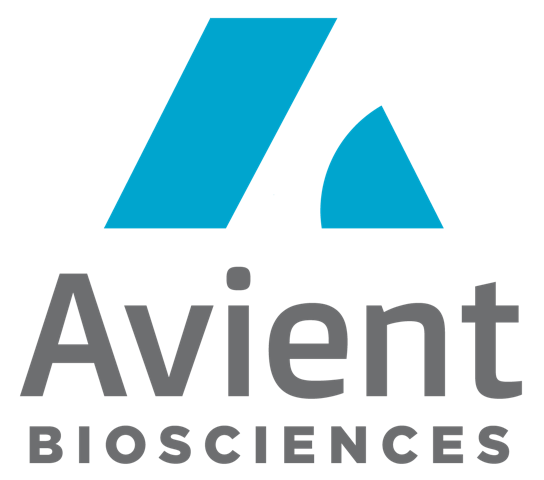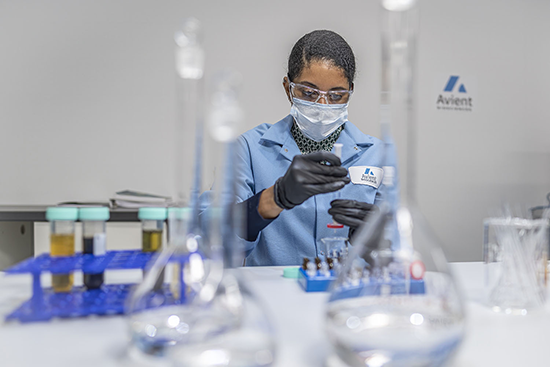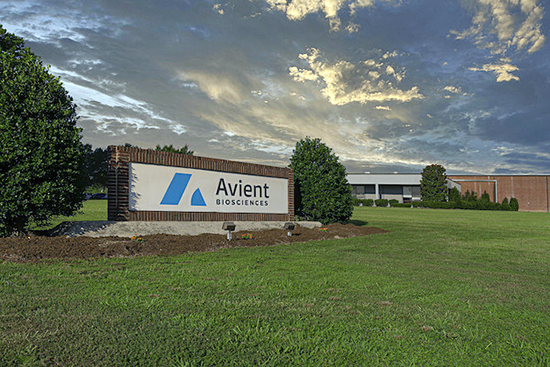
In Wild West Cannabis Sector, Avient Bio Sets Out to Be the Big Gun
 Cannabinoid ingredients produced by Avient Biosciences can be found in nutraceuticals that consumers purchase to ease lingering ailments or improve overall health. But step inside the company’s new hemp research and extraction facility and it looks like it’s set up to produce pharmaceutical ingredients. That’s because soon, it might be.
Cannabinoid ingredients produced by Avient Biosciences can be found in nutraceuticals that consumers purchase to ease lingering ailments or improve overall health. But step inside the company’s new hemp research and extraction facility and it looks like it’s set up to produce pharmaceutical ingredients. That’s because soon, it might be.
The Wilson, NC-based company built its facility to not only meet the FDA’s current good manufacturing practice (cGMP) regulations for food ingredients, but to also comply with the higher bar set for pharmaceutical-grade products, said Avient CEO Miles Wright.
Regulation of cannabis and ingredients that are derived from the plant are still largely unwritten, leaving companies to operate in a “wild west” manner lacking rules and structure. As that framework takes shape, Wright expects pharmaceutical companies will ramp up drug research on cannabinoids, compounds produced by the plant that bind to cannabinoid receptors found in the central nervous system. According to Wright, Avient is “moving as quickly as we can” to active pharmaceutical ingredient manufacturing.
“We do believe that the FDA is going to come in and in some way, shape, or form provide some guidance in this space,” Wright said. “When they do, I think there are larger corporate players that are going to come into the space and they’re going to need suppliers.”
Growth of hemp production and state of the sector
The opening of Avient’s new site in October came at a time of tumult in the cannabis sector. Projected demand for products derived from cannabis had led to a surge in production of hemp, a variety of cannabis sativa grown specifically for industrial applications, Wright said. Farmers expected to get more money per acre from hemp than they could from traditional row crops.
The resulting surge in hemp supply fed the launch of numerous cannabinoid companies.

The new hemp processors found that they had built out their operations ahead of the market demand, and a sector shakeout forced many companies to retrench.
The stock prices of publicly traded CBD producers Canopy Growth and Aurora Cannabis have plummeted from levels a year ago. Among the challenges that Canopy cites in its 2019 annual report is a slower than an anticipated rollout of retail stores in Canada.
One of the biggest CBD companies to falter was privately held GenCanna Global, which filed for bankruptcy protection at the beginning of the year.
The current demand for CBD ingredients is for products that help with anxiety, sleep, or pain relief, according to Wright, who added that he eases his own knee pain with CBD oil that’s meant to be an alternative to prescription painkillers.
Right now, the only FDA-approved drug that contains a cannabinoid as the active pharmaceutical ingredient is Epidiolex, which was awarded the regulatory nod in 2018 for treating seizures caused by Dravet syndrome and Lennox-Gastaut syndrome, two rare forms of epilepsy.
In July, United Kingdom-based GW won an additional FDA approval for its drug as a treatment for the seizures caused by tuberous sclerosis complex.
NCBiotech nurtures growth
The North Carolina Biotechnology Center recruited GW to set up its U.S. headquarters in North Carolina.
The Biotech Center also provided GW and its U.S. subsidiary, Greenwich Biosciences, initial office space via the Landing Pad, a program that helps companies get a foothold in North Carolina.
Paul Ulanch, executive director of NCBiotech’s crop commercialization program, said that GW was viewed as potentially leading the way of a wave new drug companies turning to CBD for pharmaceutical applications. But so far, demand from such companies developing and testing CBD-based therapies has yet to materialize, he added.
What's on the horizon
Wright expects Avient will initially see cannabinoid demand from companies located outside of the United States.
Other countries have more defined regulations governing the sourcing and production of cannabis-derived ingredients, which he says could lead to pharmaceutical opportunities. Initially, those opportunities will likely be supplying cannabinoids or some combination of those compounds for drug research. Wright expects a focus on pharmaceutical ingredients will help Avient stand out in a sector where others have stumbled.

Executive Director,
Crop Commercialization Program,
NCBiotech
“When you’re entering into an industry that is going through a significant retraction, it’s always concerning,” said Wright, a former executive of Root Bioscience, a Morrisville-based hemp processor. “But the lane and the approach we’re taking to it is still rare— and that is a high-compliance, pharmaceutical-level manufacturing operation.
The challenge for hemp growers and processors is finding enough demand for products derived from the crop, according to Ulanch. Cannabis grows like tobacco and North Carolina has experienced farmers who have the right equipment to handle the crop, which means growers are well-positioned to address demand.
But Ulanch said that the demand won’t necessarily be for pharmaceutical-grade products. He has spoken with researchers at North Carolina State University about studying hemp for use in the state’s textile industry. For the state’s growers, hemp wouldn’t become a cash crop but it could be an added to the rotation of corn, soybeans, and other crops.
“That to me may be where there is a unique opportunity for North Carolina,” Ulanch said. “It’s less of a biotech story but it’s a cool textile story.”
About Avient's new facility
Avient’s Wilson facility is 200,000 square feet situated on 36 acres. The site includes a warehouse to store hemp, as well as an extraction and processing facility. That’s bigger than another Wilson hemp processor, Criticality, which configured its 55,000 square-foot facility with extraction technology used in both the food and pharmaceutical industries.

Wilson facility
Both companies must compete globally and domestically against Clever Leaves, a Colombia-based cannabis company that has set a goal of becoming the world’s largest hemp processor, Ulanch said. In addition to its South American operations, the company, which has raised $100 million to scale a business targeting consumer and pharmaceutical applications, maintains sites in Europe and Canada. In the U.S., it operates an extraction and processing site in Arizona.
Wright declined to provide details on the financial backing of Avient other than to say the cash amounts to “many millions of dollars” invested by a small collection of private individuals. Avient currently employs 25; Wright says he plans to hire more people as more customers sign on. The new company is also contributing to the region’s economy in another way: All of the hemp it processes comes from within the state.
“Everything we’re using we’re supporting the growers in North Carolina,” Wright said.
